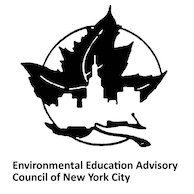
Online Conference — Access information provided after registration
Join EEAC as we strategize for teaching climate change and civic engagement to students of all ages.
Join Your Colleagues To Build On The Work of TEEP I, II, III, and IV, now "The Forum" Workshop.
Join informal educators, classroom teachers, college professors, and policy makers to develop strategies that will enhance how we teach students about climate change and invite them to participate in the civic process. Guided by the Biden Climate Plan, the discussion will focus on sharing resources that already exist and identifying gaps where new programming and partnerships are needed.
CLIMATE CHANGE EDUCATION AND CIVIC ENGAGEMENT
AGENDA
3:30–3:40 WELCOME, River DiLeo - Chairperson
EEAC INTRODUCTION, Mike Zamm - EEAC and Dr. Mary Leou - NYU, Co-Chairs, The Forum
3:40–4:15 FORUM AND RELATED PROJECTS
- Database on EE Resources (EE Clearinghouse), River DiLeo, Fran Agnone, Shig Matsukawa, EEAC Steering Committee
- TEEP Syllabi Bank, Mike Zamm, Mary Leou
- Current Initiatives in Support of Climate Change Education in NYC/NYS - Work of the Climate Education Task Force - Emily Fano, Senior Education Manager, National Wildlife Federation (NWF)
4:15–5:00 ENGAGING OUR YOUTH — EE, CIVICS AND CLIMATE CHANGE
DISCUSSION GROUPS (4)
Questions For Each Group (below) Also To Be Distributed During the Discussion Groups
A. SCHOOL BASED GREEN ENERGY SYSTEMS
Discussion Facilitator - Sarah Pidgeon, EEAC Program Committee Chair
Forum #1 (Room 1) questions:
- What curricula on climate change is available and/or can be created to reinforce student activities around school weather stations?
- What curricula on climate change is available and/or can be created to reinforce student activities around school solar energy installations?
- What activities and materials will help students understand the most effective ways to improve energy efficiency in school buildings and public transportation?
B. CLIMATE CHANGE AND SOCIETAL/GLOBAL SYSTEMS
Discussion Facilitator - Emily Fano, NWF
Forum #2 (Room 2) questions:
- What activities and materials can be used to help students understand the importance of green infrastructure in reaching zero carbon emissions?
- How can we help youth understand the relationships between addressing climate change and protecting biodiversity?
- How can we help youth explore community systems with the goal of developing plans to achieve net-zero emissions?
- How can we help youth understand the relationship between food production systems and climate change?
- What activities and materials will help students understand how an improved system of railroads can reduce carbon emissions?
C. STUDENT INVOLVEMENT IN CLIMATE CHANGE AND SPECIFIC MEASURES TO SAVE ENERGY AND REDUCE POLLUTION
Discussion Facilitator - Jody Reiss, DOE, Division of School Facilities, Office of Sustainability
Forum #3 (Room 3) questions:
- What curricula on climate change is available and/or can be created to support student comprehension of electric cars and their expansion in the U.S.?
- How can we help students explore that developing a greener economy will reduce air and water pollution and improve public health?
- What activities and materials will help students understand the need to reduce methane emissions to address climate change?
- What activities and materials can be employed to help students understand the connection between specific resilience measures and climate change?
- EEAC Annual Meeting Contribution: Please check out the Resilient Schools Consortium climate and resilience education curriculum for middle and high school students, free and downloadable at www.riscnyc.org
D. HOW DO WE HELP STUDENTS UNDERSTAND THE CONNECTIONS BETWEEN CLIMATE CHANGE AND UNIVERSAL VALUES/HUMAN RIGHTS?
Discussion Facilitator - Ray Pultinas, EEAC Secretary, Founder and Director of James Baldwin Outdoor Learning Center
Forum #4 (Room 4) questions:
- What activities and materials can be used to help instill values in students that lead to their participation in citizen action for climate change?
- EEAC Annual Meeting Contribution: Facing the Future and A People's Curriculum for the Earth has great lessons and materials
- What activities and materials can help students understand how environmental justice relates to all initiatives to address climate change?
5:00–5:30 GROUP REPORTS AND PLENARY DISCUSSION
NEXT STEPS, FUTURE PROJECTS
